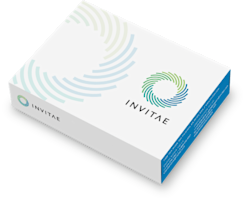
Invitae Niemann-Pick Disease Types A and B Panel
Test code: 06190 •
Test description
The Invitae Niemann-Pick Disease Types A and B Test analyzes the SMPD1 gene; which causes both conditions. SMPD1 encodes the lysosomal enzyme acid sphingomyelinase (ASM), and varying degrees of residual enzyme activity results in a clinical spectrum of acid sphingomyelinase deficiency. Niemann-Pick disease type A (NPA) and Niemann-Pick disease type B (NPB) are different manifestations along this clinical continuum and are due to differing amounts of residual ASM activity.
This panel is indicated for any individual in whom NPA or NPB is suspected based on clinical or laboratory findings. Genetic testing of SMPD1 may confirm a diagnosis and help guide treatment and management decisions. Identification of disease-causing variants provides accurate risk assessment and carrier status of at-risk relatives.
Ordering information
Turnaround time:
10–21 calendar days (14 days on average)New York approved:
YesPreferred specimen:
3mL whole blood in a purple-top EDTA tube (K2EDTA or K3EDTA)Alternate specimens:
Saliva, buccal swab, and gDNA are also accepted.Learn more about specimen requirementsRequest a specimen collection kitClinical description and sensitivity
Clinical description:
NPA and NPB are lysosomal storage disorders along the continuum of acid sphingomylinase (ASM) deficiency. There can be considerable overlap over the entire disease continuum with symptoms varying in age of onset, complexity and severity. NPA represents the more severe manifestation of ASM deficiency while NPB is a milder, attenuated form. Individuals affected with NPA generally have absent, or less than 1%, of normal ASM activity and manifest severe neurological deterioration and hepatosplenomegaly. Hepatosplenomegaly is often the first observed symptom and is noted in infancy. A characteristic cherry-red spot can be seen on ophthalmologic exam. Death typically occurs by 2 to 4 years of age secondary to respiratory or liver failure. NPB is a more mild form of ASM deficiency and affected individuals retain approximately 10% residual ASM activity. Typical clinical features include hepatosplenomegaly respiratory complications, thrombocytopenia and short stature. Only about a third of individuals with NPB have the cherry-red spots and/or neurologic abnormality. Survival through adulthood is common. An intermediate form of ASM deficiency between the two extremes called NP Type A/B has also been described.
Assay information
Invitae is a College of American Pathologists (CAP)-accredited and Clinical Laboratory Improvement Amendments (CLIA)-certified clinical diagnostic laboratory performing full-gene sequencing and deletion/duplication analysis using next-generation sequencing technology (NGS).
Our sequence analysis covers clinically important regions of each gene, including coding exons and 10 to 20 base pairs of adjacent intronic sequence on either side of the coding exons in the transcript listed below, depending on the specific gene or test. In addition, the analysis covers select non-coding variants. Any variants that fall outside these regions are not analyzed. Any limitations in the analysis of these genes will be listed on the report. Contact client services with any questions.
Based on validation study results, this assay achieves >99% analytical sensitivity and specificity for single nucleotide variants, insertions and deletions <15bp in length, and exon-level deletions and duplications. Invitae's methods also detect insertions and deletions larger than 15bp but smaller than a full exon but sensitivity for these may be marginally reduced. Invitae’s deletion/duplication analysis determines copy number at a single exon resolution at virtually all targeted exons. However, in rare situations, single-exon copy number events may not be analyzed due to inherent sequence properties or isolated reduction in data quality. Certain types of variants, such as structural rearrangements (e.g. inversions, gene conversion events, translocations, etc.) or variants embedded in sequence with complex architecture (e.g. short tandem repeats or segmental duplications), may not be detected. Additionally, it may not be possible to fully resolve certain details about variants, such as mosaicism, phasing, or mapping ambiguity. Unless explicitly guaranteed, sequence changes in the promoter, non-coding exons, and other non-coding regions are not covered by this assay. Please consult the test definition on our website for details regarding regions or types of variants that are covered or excluded for this test. This report reflects the analysis of an extracted genomic DNA sample. In very rare cases, (circulating hematolymphoid neoplasm, bone marrow transplant, recent blood transfusion) the analyzed DNA may not represent the patient's constitutional genome.
You can customize this test by clicking genes to remove them.
Primary panel
Chitotriosidase (chito) is an enzyme that can be elevated in some untreated lysosomal storage disorders such as Gaucher disease and Niemann-Pick types A, B, and C. The degree of elevation generally correlates with disease severity. Plasma chito levels are often utilized as a biomarker in the diagnosis and management of individuals with the aforementioned conditions. However, certain variants in the CHIT1 gene lead to absent or decreased chito levels (chito deficiency), limiting the utility of chito as an accurate biomarker unless genotype is available to aid in the interpretation of results. On its own, chito deficiency does not cause any human disease. This gene can be added at no additional charge.
Question about billing?
Find answers